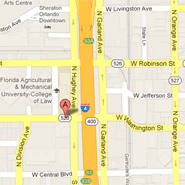
|
|
|
|
|
 |
|
 |
|
Bankruptcy Court
|
|
 |
|
 |
|
|
United States Bankruptcy Court
Middle District of Florida
George C. Young Federal Bldg
400 West Washington Street
Orlando, FL 32801
Bankruptcy Court Website

|
|
|
 |
|
 |
|
|
|
|
|
 |
|
 |
|
SSL Secured
|
|
 |
|
 |
|
Our site is 256 bit SSL SECURED. SSL (Secure Socket Layer) is the industry standard for viewing and sending sensitive information on an internet browser.
Click on the SSL image below see our site report.

|
|
 |
|
 |
|
|
|
|
|
 |
|
 |
|
Bankruptcy - Frequently Asked Questions
|
|
 |
|
 |
|
Q: What is a Chapter 7 Bankruptcy?
A: Chapter 7 is the most common form of bankruptcy. It is also the simplest
to file. In a Chapter 7 bankruptcy, you will not repay many of your debts, and your creditors will be forbidden to attempt
collection from you.
Unsecured debts such as credit cards, medical bills, personal signature loans and all other loans and debts that are not
secured by collateral are generally discharged (meaning gone forever!) in a Chapter 7 bankruptcy.
Certain debts are not dischargeable, including any debt that is not listed in your schedule of creditors, certain taxes,
alimony, child support, criminal debts, most student loans, and a few others. We can help you to determine whether or not
a debt will be eligible for discharge.
|
Q: What is a Chapter 13 Bankruptcy?
A: Chapter 13 is also known as a reorganization or consolidation bankruptcy,
since your debts are reorganized into a payment schedule over 3 to 5 years. At the completion of the Chapter 13 plan,
your debts will be discharged, much like in the Chapter 7.
Certain debts that would not be dischargeable in a Chapter 7 may be handled in a Chapter 13. We will advise you on
whether Chapter 13 would be appropriate for you, depending on your income, assets, and type of debts.
|
Q: Do I Get To Keep My Property?
A: You are entitled to keep a generous amount of your belongings when
filing bankruptcy. Florida law now provides for personal exemptions of $1,000.00 in an individual case or $2,000.00
in a joint case for personal property. There are additional exemptions for cars, medical devices, retirement plans
and certain other assets.
|
Q: Can I Keep My House?
A: Florida law allows exemptions for equity in homestead property of $125,000.00
for property you have owned for less than 3 ½ years. For homestead property you have owned for more than 3 ½ years the
homestead exemption is unlimited. Homestead is generally defined as your personal residence (mobile home or house plus land)
that you are living in at the time of the bankruptcy filing. Equity is determined by subtracting the fair market value of your
home from the amount of the mortgage payoff.
You should not have a problem keeping your home in a Chapter 7, as long as you are current on your house payments both at
the time of filing and also in subsequent months. If your equity exceeds the allowed exemption or if you are behind in your
payments, a Chapter 13 might allow you to save your home.
The automatic stay protects you from foreclosure of your house during the time your bankruptcy case is open. However, if your
payments fall behind after filing, the bank may ask for court permission to lift the automatic stay and begin foreclosure
proceedings.
|
Q: Can I Keep My Vehicles?
A: Florida state law allows each individual to keep $1,000.00 equity in a motor
vehicle in an individual case or $2,000.00 in a joint case. To determine the amount of equity you have, we will need an
accurate current RETAIL market value of all of your vehicles as well as the payoff amount.
If you have a loan on your vehicle, you must keep the payments current during and after the bankruptcy to avoid repossession.
If your car is "upside down," meaning you owe more than it's worth, and you can manage without it for a few months, we recommend
that you look into the possibility of surrendering the vehicle, which allows you to get out from under that crushing monthly debt
and purchase or finance a less expensive car after bankruptcy. Another possibility is to “redeem“ the vehicle by paying the current
retail value of the vehicle, and the remaining loan balance would be discharged. We may be able to assist you in finding a lender
that will give you a new loan to pay this redemption amount to your existing lender, which could save you thousands of dollars
compared to your current vehicle loan.
|
Q: Will I Lose My Retirement Savings?
A: Most retirement savings plans are protected by the Employee Retirement Income Security
Act (ERISA), and are exempt from bankruptcy. We can help you determine whether your specific retirement account will be protected
in bankruptcy and do our best to keep the savings intact for your retirement. Also, Individual Retirement Accounts (IRAs) are
generally fully protected in bankruptcy.
|
Q: When Will The Harassing Phone Calls From Creditors Stop?
A: The automatic stay goes into effect the moment your petition is filed. Once your petition
is completed, it will be filed electronically, meaning that we can get a case number instantly. At this point, creditors must stop
contact with you, including telephone calls, letters and all legal actions. Your creditors will receive an official notice from the
United States Bankruptcy Court.
|
Q: Will My Bankruptcy Filing Be Published In My Local Newspaper?
A:
No! However, bankruptcy information is part of the public record, just like state court
proceedings. Bankruptcy matters are handled in federal court, with documents filed in Orlando. Your court appearance will be held
at the United State Bankruptcy Court in Orlando (135 West Central Blvd.).
|
Q: Will I Ever Get Credit Again?
A:
Yes, a bankruptcy can actually clean up your credit report, and may reflect better than
repossessions, foreclosures or even late payments. Bankruptcy will typically improve your debt-to-income-ratio, which is an important
factor that creditors consider when extending new credit. Although a bankruptcy can remain on your credit report for up to 10 years,
most people resume normal credit activities immediately after receiving their discharge. The interest rates may not be prime, and some
waiting periods may apply, but you can begin re-establishing your credit immediately, as long as you stay current on your payments.
However, we will counsel you to change your spending habits to get away from dependence on credit and avoid the credit trap in the future.
|
Q: Can I Keep a Credit Card After the Bankruptcy?
A: People often ask if they can keep a credit card after filing bankruptcy. Maybe they have a
credit card they use for travel, maybe it’s one used for everyday purchases and paid in full at the end of every billing cycle, maybe
it’s one with a zero balance. However, in all these cases the answer is, NO. One cannot keep
a credit card through a bankruptcy.
There are two reasons for this. First, a debtor is obligated to list all debts in bankruptcy and affirms this under the pains and
penalties of perjury. The bankruptcy discharge, once entered, will then discharge the credit card balance.
Although it’s theoretically possible, no credit card creditor that I know of has ever extended new credit on the same account once
the balance was discharged. So, this begs the question: What about cards with no balance due at the time of the bankruptcy? Well,
these are not “debts“ and technically do not need to be listed in a bankruptcy. However, credit card creditors are some of the biggest
customers of the credit reporting agencies and, consequently, receive reports about the bankruptcies of their account holders. After
learning of the bankruptcy from the credit bureaus, it is normal for a credit card creditor to simply cancel the account, even if it’s
not listed in the bankruptcy.
Most people though will get offers for new credit cards after the bankruptcy discharge. They will not be the best credit cards,
(they may have high interest rates and low lines of credit) but they can be used to help you re-establish your credit. Using the
new cards for small purchases (like gas and groceries) and timely paying off the balance in full each month will help you re-establish
your credit, and you will soon be offered better cards with better terms. For most people, their credit can be re-established within a
year or two.
|
The Law Offices of Roy A. Praver has provided this information in a PDF format for your
convenience.
|
You need Adobe Acrobat Reader X or greater installed to view and print the documents. If you do not have Adobe Acrobat Reader
X or later installed, you can upgrade to the latest version FREE
by clicking on the Adobe image to the right.
|

|
|
| Additional Information |
Look through the links below to additional information about your rights on filing Bankruptcy. Once you have looked through the
information then call the Law Offices of Roy A. Praver to setup your
free bankruptcy consultation to determine if filing Bankruptcy is the correct
step for you.
|
| Contact Us |
If you are considering filing for bankruptcy, you do not have to make this decision alone.
The Law Offices of Roy A. Praver can provide you with the help
and support you need to handle your financial situation. Contact the
Law Offices of Roy A. Praver today at
321-383-3445 to schedule a FREE
initial consultation.
Titusville, FL Office
O: 321-383-3445
F: 321-268-9564
Prior to your appointment, we ask that you send us an
email
and briefly describe or list any questions you have about bankruptcy. Most of your questions can be answered from information provided on our website, but please feel free to
contacts us.
We are always here to help you.
|
|
|
|
|
 |
|
 |
|

|